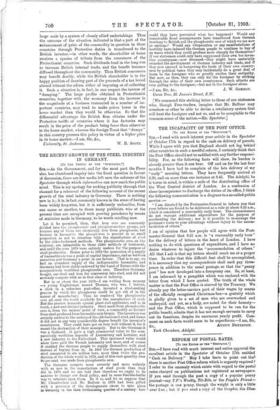THE INCAPACITY OF THE POST OFFICE.
rTo THE EDITOR OP THE "SPECTATOR."' SIR,—I read with much interest your article in the Spectator of October 17th in regard to the cash on delivery of parcels. While I agree with you that England should not lag behind' other countries in such a needful reform, I certainly think that the Post Office should not be saddled with any further responsi- bility. For, as the following facts will show, its burden is already greater than it can bear. Off and on for the last four months I have had to complain of the late delivery of my " early " morning letters. They have frequently arrived at 8.30, and on more than one instance at 8.45. The Adelphi, be it borne in mind, is within a mile of the distributing office of the West Central district of London. As a confession of sheer incompetence to discharge the duties of its office, I think the following communication is a disgrace to a so-called public
service :—
"I am directed by the Postmaster-General to inform you that your letters are found to be delivered as a rule at about 8.25 a.m., which is considered a reasonably early hour. The circumstances do not warrant additional expenditure for the purpose of accelerating the delivery; nor is it possible tore-arrange the postman's route to your advantage without injury to the accom- modation of others.'
I am of opinion that few people will agree with the Post- master-General that 8.25 a.m. is "a reasonably early hour" for the delivery of letters in the heart of London. I have nothing to do with questions of expenditure, and I have no desire whatever to injure the "accommodation of others." All that I ask is that my letters should reach me at a proper time. In order that this difficult feat shall be accomplished, it is necessary that my correspondents shall each pay three- pence in addition to the usual postage, so that the " penny post" has now developed into a fourpenny one. So, at least, I am informed by a pamphlet which was enclosed with the letter from which I have quoted. The truth of the whole matter is that the Post Office is starved by the Treasury. We , already pay the letter-carriers part of their wages by means of the officially recognised Christmas-box—a gratuity which is gladly given to a set of men who are overworked and underpaid, and yet, as a body, are noted for their honesty— and the Post Office, which is supposed to be run for the public benefit, admits that it has not enough servants to carry out its functions, despite its enormous yearly profit. Com- ment on such facts would seem to be superfluous.—I am, Sir,


















































 Previous page
Previous page